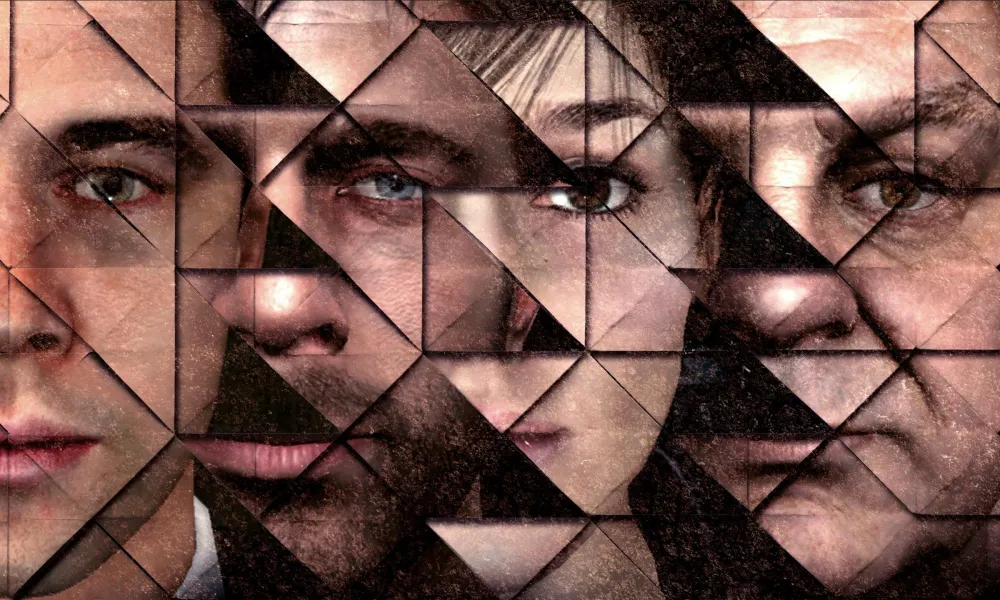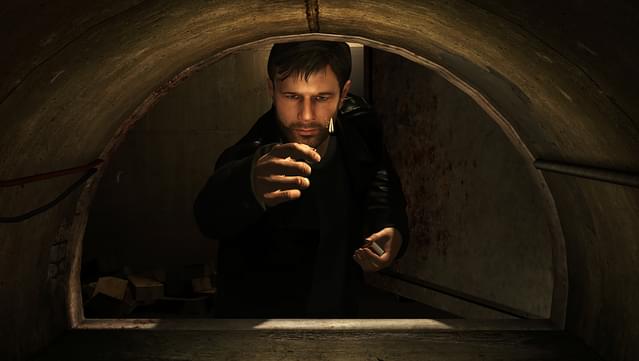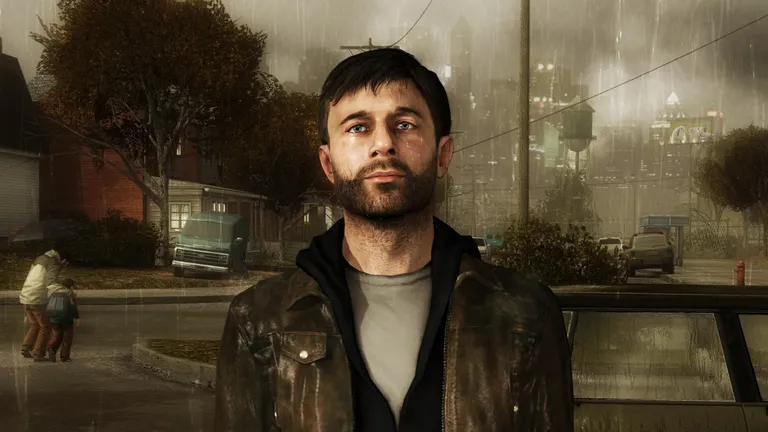This article written by TVPulse Magazine editor Jennifer Griffin originally appeared in ChevronOne.com on May 23, 2011. Restored (via The Wayback Machine), and reprinted with permission.
Pascal Langdale is clearly not one to rest on his laurels.
Despite being a RADA trained actor of film, television and theatre, with an extensive list of credits to his name, he also runs his own motion capture company, Motives in Movement.
The company aims to bridge the distance between traditional and new mediums in motion capture technology for the purposes of better dramatic content — something Pascal already knows a thing or two about. The actor is perhaps best loved by gamers for his role as Ethan Mars in the bafta award winning Heavy Rain from Quantic Dream.
And if that’s not enough to make your head spin, Pascal is currently working on Bryan Singer’s Jack the Giant Killer alongside Ewan McGregor and Ian McShane.
In spite of it all, he made time to chat with us about acting, accents, motion capture technology and of course, that game!
ChevronOne: What is your favourite acting medium? Theatre, film, TV or games?
Pascal Langdale: I like working in all media, each presents different challenges and rewards. In fact, working in a variety of media means I learn skills and techniques that are adaptable to the completely novel challenges that interactive drama and Capture hold.
CO: What are you currently working on?
PL: I have a small part in Bryan Singer’s Jack the Giant Killer, filming in the UK. Plus, I set up Motives In Movement, which is a company dedicated to providing cross-discipline solutions to the challenges developers face handling dramatic content. We should have some interesting news at the beginning of June. The fruition of something I’ve been working on for a while. Its very exciting, and I wish I could tell the world, but I’m learning the merits of keep things quiet until you’re ready.
CO: Are you a gamer, and if so, what is your all time favourite game?
PL: I am a gamer when I have time. I like a good game of poker, and Scrabble is constant favourite. As for video games, which I guess might be your real question, I have no all-time favourite. I dropped playing in my late teens and only picked it up again recently. I loved Elite, back in the day. I’m interested in games that make me feel something other than the urge to kill, although I enjoy a bit of that too. Flower is great, and there’s a whole list I want to get through. But getting time is an issue.

CO: While you were making Heavy Rain, did you have any idea how successful it was going to be?
PL: We knew we were onto something special, but the gamers and the industry can be pretty fickle. With the distance that can exist between promises that are a marketing necessity, and what’s actually delivered, persuading players that something really is new, different, revolutionary etc… can be a tough call. Where do you put Heavy Rain on the shelves? Its an interactive drama, sure, but I think its part of a bigger genre I would define as an “Empathy Game”. A game that creates and relies on creating an emotional and empathetic relationship between the player and the avatar (whatever its shape and form) to effect player choices and behaviour. Empathy is an integral part of this kind of game experience.
Pascal Langdale (left) with ‘Heavy Rain’ co-star Leon Ockenden
CO: Do you still get a lot of feedback from players?
PL: I get tweets, emails, and sometime people I work with bring it up. Despite the cultural revolution I believe that Games are a part of, the world is still broadly divided into those who play, and those who don’t.
CO: What do you think Heavy Rain got right in terms of story and character that other games have failed to do?
PL: Firstly, a gripping story that led you into the gameplay sequences. The story was the foundation for the gameplay, and not an afterthought. Narrative and dramatic content is so often bolted on towards the end of the workflow, and it suffers as a result.
Secondly – making a game out of interactive dramatic choice; it’s the closest a player will get to the best part of being an actor – without all the script learning, risk, and constant work hustle. You get to be that character in that situation and make choices with unknown repercussions, That’s what actors try to do. Forget they know what happens next. Even on Heavy Rain I knew the multiple choices I had, and how they played out. But that feeling of flying, guided by instinct and emotion. That’s cool.
CO: Games are becoming more sophisticated and subtle in terms of narration and character. More like TV. Do you see a convergence between TV and games at some point in the future?
PL: Game is most often associated with Film. And so far as mise en scene and sets, of course. But the scripts are more like high turnover TV series, something that’s often missed in the discussion about what the crossover might be. Cutscenes, and even interactive ‘Scenes’ have to carry plot exposition, whilst making you believe in, and feel for the characters – all very efficiently. And the progress tends to be more episodic in nature than film. As for future convergence – well I’ve been to transmedia conferences and its like the holy grail, and has been for over a decade. Everyone’s waiting for something that will break the spell that are keeping the mediums segregated. I can imagine a day where a game allows you to play the back story of a supporting character in a TV series, that helps you understand why they are the way they are. You’ve been there – you were with them – perhaps you were them. But I think each medium has to obey its own rules, and not try to be everything at once. Although a caveat to this is that compared to traditional media, the rules of Game Development are still being written!
CO: LA Noire was released last Friday. David Cage has described its motion capture technology as ‘an interesting dead end.’ Would you agree?
PL: I’m not sure what he was getting at in that interview. I think he meant that capturing face and body at film-level graphic fidelity is the ideal, and probably the future. Sure. I agree with that. I don’t know when that’ll be, or when it’ll be within the budget of a majority of interested developers, though. And currently the split process still has its advantages. The challenge now and in the future is to create a workflow and develop convergent skill sets that guarantee the best chance of creating the best dramatic content. Something that can compete with film dramatically as well as visually. The tech is way ahead in this regard right now. HR’s tech was being surpassed while they were making it. It’s the way of the high technical evolution rate. But his tools of yesterday, could be other developers tools of today – and everyone can learn better ways of using what we have, rather than assuming that a great interactive drama can only come on the back of a huge budget and the newest tech. If you only ever waited for the new tech you’d never make a game. More generally what I’m talking about here, requires a cultural shift. Where things like high quality story telling, respect for actors performances, the vital role of a dedicated director, and the development of truly convergent practices come into the workflow. Content is king. For me, a bad story, badly told, sucks. Doesn’t matter what medium you’re talking about. And dramatic content is pretty much everywhere except in pure gameplay elements. Its possible for the way a captain salutes, or a hand reaches for a door handle, to be packed with dramatic content. Actors and directors are the best team to create these dramatic and nuanced performances, as they create behaviours that are specific to character and situation, work in the bigger picture, and often provide surprising and un-predictable results. It avoids cliche, and allows for the chaos and mess that makes us human.

CO: Nolan North (who plays Nathan Drake in Naughty Dog’s PS3 title Uncharted) recently said that movie stars aren’t really interested in doing games, but actors are. (Quote: “There is a freedom and a beauty in doing this, that is just like going back to your roots of black box theatre. It’s not like, let’s give Vin Diesel a million dollars for Riddick and he’ll do a session. It’s changed.”) What attracts a working actor to a games project?
PL: I think we’d get along – do you have his email? Yep, another parallel between game and other media that is often missed is its similarities with theatre. Theatre is interactive – think of comedy, for example, as the performer you have to wait for the right moment while the audience is laughing, or choose to wait until they’ve stopped to deliver the next line. Even Hamlet requires you gauge the responses of an audience to some degree. But for full interactivity, theatre has it – “forum theatre” for example, where the audience stops the actors, and tell them the direction the scene should take. Capture is more like performing in a studio theatre in-the-round. The Audience can be looking from anywhere, 360 degrees, just like the player might. So you have someone watching you up close and personal and also at some distance and behind. Maybe its because there’s rarely a camera to direct your performance to. But the ad hoc nature of building the sets, the feeling of acting in an open space, and the interactive feeling of playing multiple possibilities – give it a feeling of a ‘live performance” – all these make it a blend between film, theatre and TV – but also Capture and have development have unique challenges too. As for film actors, well games are a huge time commitment for an actor. Time wise its hard to fit it in with a career that is booked with 12 week films that may or may not happen over the next two years. I’m not sure if there’s a snobbery about capture and games so much as ignorance. The sort of experience I’ve had giving a dramatic performance for a game is quite unique, and is only shared with a small handful of others.
CO: You run your own ’emotion-capture’ company, Motives in Movement. Was MiM something that evolved AFTER your experience with Heavy Rain or something you wanted to do from before that time?
PL: After. I saw that there was a distance between traditional and new mediums, and that solutions to certain challenges had to come from a blend between them. I’d been working on my own acting technique, researching Nonverbal Behaviour and behavioural psychology for about 8 years before I started Heavy Rain. I figured that if he was around today Stanislavski would be doing the same thing – looking at modern research into human behaviour, and figuring out how that might help transforming yourself, getting into another person’s skin. It turned out that some of this knowledge and the theories I was working with was a great match for animation. Animators rely on tools that are founded on categorising and re-creating expressions, for example. I take a completely different approach. Anyway, that’s how it started – and then I realised that there was a bigger service I could provide – collecting people that understand and have worked in traditional and high level game development, all working together with developers to create better dramatic content.
CO: Would you ever consider making a game yourself? And if so, what type of story would you set out to tell?
PL: I did consider it once. An opportunity came up, and I could’ve thrown myself in. But after a brief look in the mirror, I knew that I wasn’t a game developer. No more than David Cage is an actor. It would be arrogant of me to presume that I have the skills and experience to create a game from beginning to end. Having seen what’s required on Heavy Rain, and having talked with some top studio heads, I have immense respect for what they do. As for the story? Hell, there’s a million I could choose. Human interest rather than guns and bombs. That doesn’t exclude aliens of course!
CO: You’re a bit of a wizard with the accents. What do you attribute this to?
PL: That’s very kind of you. I know I make a few slips on Heavy Rain with the American accent, and if I’d had my way I’d have re-dubbed them as you would on a movie. But the script was huge and time was short. I did get to re-dub the worst offences, and this is a rare thing in game. Over the long period of working on HR my accent improved, and according to some pretty merciless Americans it’s spot on, these days. As for why? Well some of it is hard graft and practice, and some is natural. My mother was French and I live in a hugely culturally diverse city. I love the fact you’re often in a room full of people and you’re the only born Londoner! It seems that the majority are from somewhere else in the UK or abroad. It’s one of London’s best traits.
